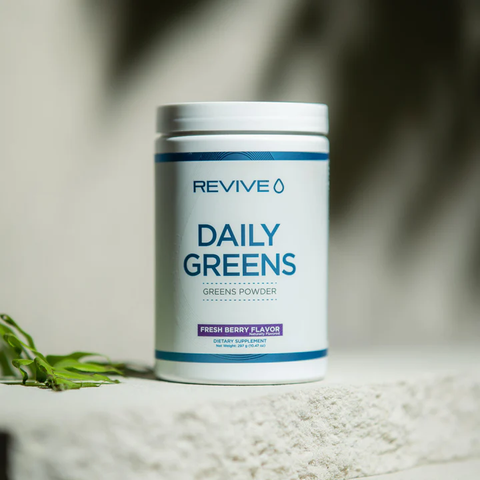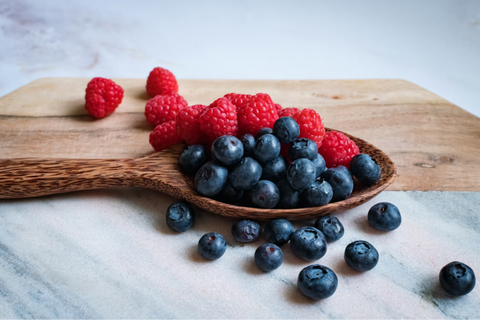The Best Greens Supplement for Bloating in 2024
Bloating is a widespread issue that affects many people. Needless to say, it causes quite a bit of discomfort and disruption in daily life. Whether you're dealing with irritable bowel syndrome (IBS) or simply trying to maintain good overall health, bloating can be a recurring problem — but it doesn’t have to be!
Research suggests that a wide range of people with IBS or other digestive conditions experience bloating, while approximately 10% to 25% of otherwise healthy people also report occasional abdominal bloating. Despite its common occurrence, bloating should not be overlooked, as it can have a significant impact on well-being and quality of life.
Understanding the underlying causes of bloating might just help you find some relief. When you eat, your gastrointestinal (GI) tract naturally accumulates gas as part of the digestion process. This gas contains a mixture of gasses like oxygen, nitrogen, carbon dioxide, hydrogen, and sometimes methane.
Certain foods, especially carbohydrates, may not be fully digested in the small intestine and are instead fermented by bacteria in the large intestine. This fermentation process produces additional gas, which can, unfortunately, lead to bloating and discomfort in the abdomen.
To address bloating and promote digestive health, a lot of people turn to greens powders. These green powders are specially formulated with ingredients that are designed to target the underlying causes of bloating. In this review, we’ll be talking about the best greens powder supplement for bloating, so don’t go anywhere!
The Best Greens Supplement for Bloating

There are many benefits to incorporating a daily organic greens powder into your diet, such as improved digestion and energy levels, along with increased antioxidant protection and nutrient density. Not only is taking a greens powder for bloating budget-friendly, but it's also incredibly convenient. It’s an excellent option for those looking to enhance their dietary intake and immune health without spending a lot of time and money preparing meals or snacks.
If you've been looking for an easy way to improve your health, consider adding some delicious greens powder to your daily routine. Your body will thank you in the long term! In this review, the Revive MD team will thoroughly assess Revive Supplement Daily Greens Powder, which is particularly useful for addressing bloating and supporting gut health. Let’s take a closer look at Revive MD’s Revive Supplement Daily Greens Powder below:
Benefits of Revive Supplement Daily Greens Powder
Revive Supplements Daily Greens Powder for bloating support is a natural blend that was designed to improve your health by providing your body with a concentrated mix of nutrient-packed greens. It contains beneficial ingredients like Wheatgrass, Spirulina, and Chlorella, as these ingredients work together to improve energy and vitality.
Every dose of Revive Supplements Daily Greens Powder contains 3g of nutrient-rich greens — packed with essential vitamins, minerals, and antioxidants. Plus, it's loaded with digestive enzymes and prebiotics to support a healthy gut and digestion. Needless to say, it’ll definitely help with bloating!
Our Daily Greens superfood powder is perfect for people who don't eat enough fruits and vegetables daily. If you struggle to get your recommended intake of fruits and veggies, this supplement is definitely made for you.
Regular use of this natural blend boosts fiber intake and provides a high ORAC (oxygen radical absorbance capacity) blend. It’s a great option for those who are trying to maintain good health!

Ingredients
Inulin (Fiber)
Inulin, a key ingredient, is a type of fiber that’s found in certain foods. Studies suggest it offers health benefits. For example, it could improve digestion, help with managing diabetes, and assist with weight loss. Inulin is known for its role in promoting gut health since it provides essential daily fiber.
Greens blend
Our Greens Blend includes plenty of different fruits and leafy green vegetables, all of which have been carefully selected to provide you with an abundance of antioxidants. Antioxidants support the body’s detoxification processes.
Fruits blend
Our blend of fruits contains natural ingredients that are typically found in our diets. However, it can be difficult to get all of these nutrients on a daily basis. Our digestive blend helps bridge the gap, which means if you take our daily greens supplement, you’ll be getting all of these essential nutrients on a regular basis.
What Causes Bloating?
Bloating is frequently linked to gut imbalances like bacterial dysbiosis, food sensitivities, or conditions such as irritable bowel syndrome (IBS). These disruptions in gut health often manifest as bloating, and this prompts most people to consider making adjustments to their diets or lifestyles. Let’s take a closer look at some other common causes of bloating below:
Fluid retention
Fluid retention is another common factor contributing to bloating. Hormonal fluctuations, certain medications, or medical conditions affecting fluid regulation can all play a role. When the body holds onto excess fluid, particularly around the abdomen, it can lead to feelings of bloating and discomfort.
Hormones
You might have noticed that your stomach feels bloated at times that don't match your usual digestion patterns but instead seem linked to your menstrual cycle. If that's the case, you're not alone. As many as three out of four women mention experiencing abdominal bloating before and during their menstrual periods.
Bloating is also a common issue during the hormonal changes of perimenopause. Female hormones have a significant impact on stomach bloating, affecting it in different ways, including retaining fluids, accumulating gas, slowing down digestion, and influencing sensitivity to these factors.
Estrogen actually plays a huge role in retaining water. When estrogen levels increase and progesterone levels decrease, you might notice bloating due to retaining more fluids. Also, the expansion of the uterus just before menstruation can contribute to feeling bloated.
Hormones also interact with the digestive system. Both estrogen and progesterone can affect the production of intestinal gas by changing the pace of digestion. Furthermore, estrogen receptors in the gastrointestinal tract influence how sensitive you are to feeling bloated.
Gas
Experiencing excessive intestinal gas indicates a disruption in digestion, as gas is a natural part of the digestive process. While swallowing air or consuming fizzy drinks can introduce gasses into the digestive tract, they are usually released through burping before reaching the intestines. Inside the intestines, the majority of gas is created by gut bacteria as they ferment carbohydrates.
If there's an overabundance of fermentation happening, it suggests that too many carbohydrates have not been properly absorbed earlier in the digestive process, allowing them to reach the gut bacteria. This can occur for a number of reasons. Eating too much food too quickly can overwhelm the digestive system and impede efficient absorption, for example.
Additionally, certain people may have specific food intolerances or gastrointestinal (GI) conditions that contribute to difficulties in digesting carbohydrates. This can lead to increased fermentation in the intestines.
Food triggers
Certain foods are notorious for triggering bloating due to their high gas content or their tendency to promote gas production during digestion. Beans, lentils, and fizzy drinks can exacerbate bloating in people who are especially susceptible. It’s also worth noting that habits like overeating or eating too quickly can overwhelm the digestive system. This can, unfortunately, result in abdominal bloating.

Irritable bowel syndrome
For many people, irritable bowel syndrome (IBS) (also known as Inflammatory Bowel Disease) is a key contributor to bloating. This health condition affects the large intestine and is characterized by symptoms such as bloating, gas, abdominal pain, constipation, and diarrhea.
Other digestive issues like constipation or gastroesophageal reflux disease (GERD) may also worsen bloating symptoms, further emphasizing the complicated connection between digestive health and bloating.
Anti-Inflammatory Foods to Introduce Into Your Diet
When it comes to eating foods that help reduce bloating, any anti-inflammatory foods will help a lot. Cucumbers, papaya, and ginger are known for their anti-inflammatory effects. Foods that reduce water retention, like bananas, can also be helpful. Additionally, certain teas, such as peppermint and chamomile, can help alleviate bloating and gas.
In addition to food, dietary supplements can also be useful. Super greens are packed with ingredients that often have anti-inflammatory properties. They also contain prebiotic fiber and probiotics, both of which support digestive enzymes. Of course, it's generally a good idea to consult a healthcare professional and gradually increase your intake over time when it comes to supplements.
Now, let’s take a closer look at some of the best anti-inflammatory foods that you can introduce into your diet below:
Berries
Superfruits, like strawberries, blueberries, raspberries, and blackberries, aren't just delicious in a mixed berry morning smoothie — they're also packed with essential nutrients. These tiny organic fruits are absolutely loaded with dietary fiber, vitamins, and minerals. One especially great thing about berries is that they contain antioxidants known as anthocyanins, which have strong anti-inflammatory properties.

These antioxidants have been linked to a reduced risk of chronic illnesses and are believed to promote overall health by combating inflammation in the body. Clinical studies even suggest that the natural compounds found in berries could play a role in slowing down the development and progression of cancer.
Broccoli
Broccoli is super good for you. Alongside cauliflower, Brussels sprouts, and kale, it belongs to the cruciferous vegetable family. Research suggests that adding cruciferous veggies to your diet can lower the risk of heart disease and certain cancers. These potential benefits are linked to the antioxidants found in these vegetables.
One of the most important antioxidants found in broccoli is sulforaphane, which has especially potent anti-inflammatory effects. Sulforaphane works by lowering the levels of cytokines and nuclear factor kappa B (NF-κB) in the body, both of which are molecules that fuel inflammation. By making broccoli a regular part of your daily diet, you can reduce your bloating, support your digestive health, and more!
Avocados
If you like avocado toast, then you’re in luck! Avocados have numerous health benefits. They're packed with essential nutrients like potassium, magnesium, fiber, and healthy fats that are good for your heart. They also contain carotenoids and tocopherols, which can lower the risk of cancer and heart disease.
Reduce Bloating With Revive’s Greens Supplement Today
Bloating is an unpleasant experience, to say the least. Thankfully, with Revive MD’s Greens Supplement, you can reduce bloating and improve your digestive health. Along with this super greens powder, we offer plenty of great supplements that support organ health, stress relief, and more. That’s why we should be your number-one resource for supplements!
The information being presented in this blog is intended to be used as educational or resource information only. It is not intended to be a substitute for medical advice from your healthcare provider. This content should not be used for the diagnosis or treatment of any medical condition. If you have any questions or concerns about your health, please contact your healthcare provider. You should call 911 for all medical emergencies. Revive MD is not liable for any advice or information provided on this blog, which advice or information is provided on an “as-is” basis, and assumes no liability for diagnosis, treatment, decisions, or actions made in reliance upon any advice or information contained on this blog. No warranties, express or implied, are made on the information that is provided.





 Liver & Detox Support
Liver & Detox Support
 Gut & Digestive Health
Gut & Digestive Health
 Hormones, Stress & Metabolism
Hormones, Stress & Metabolism
 Sleep & Relaxation
Sleep & Relaxation
 Heart, Brain & Immune Health
Heart, Brain & Immune Health

